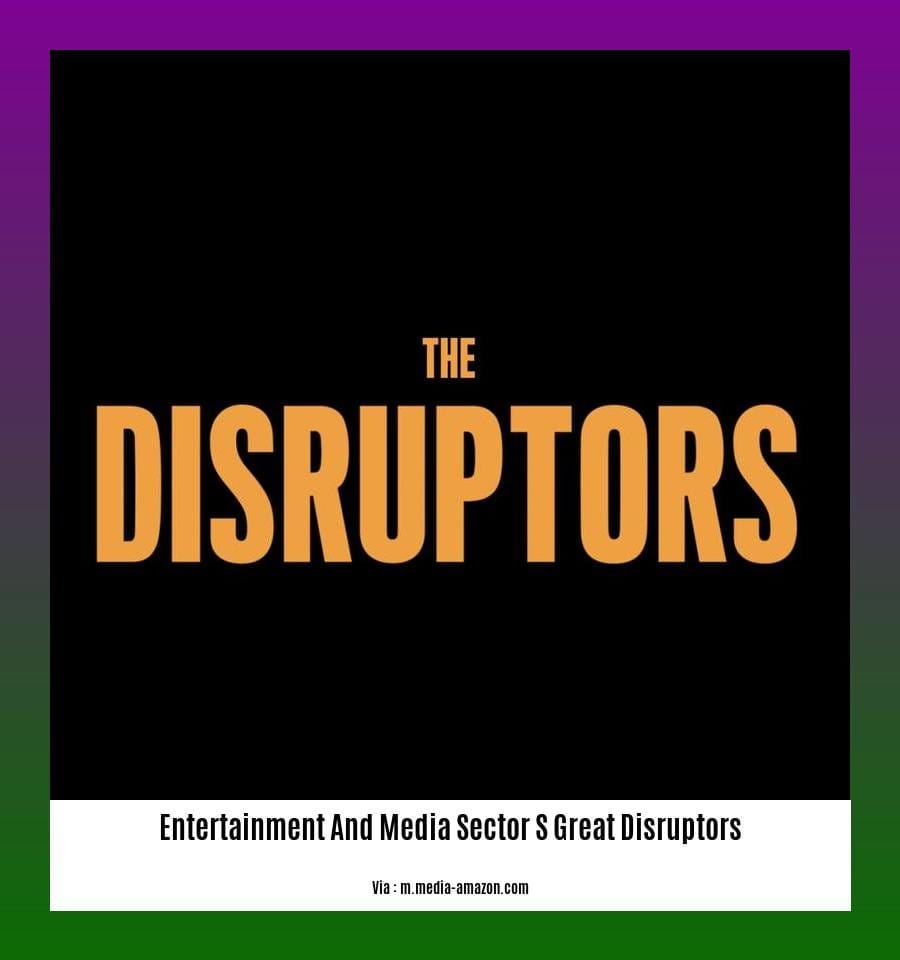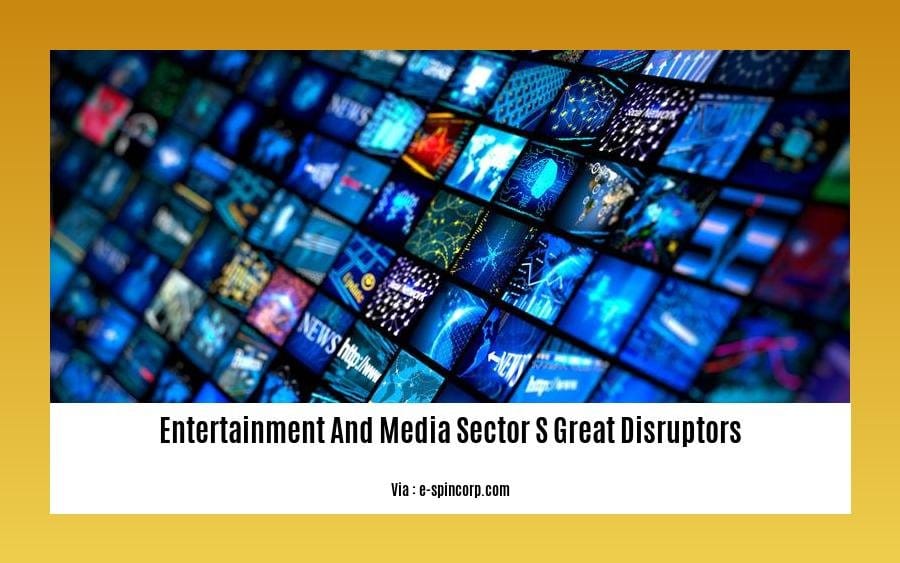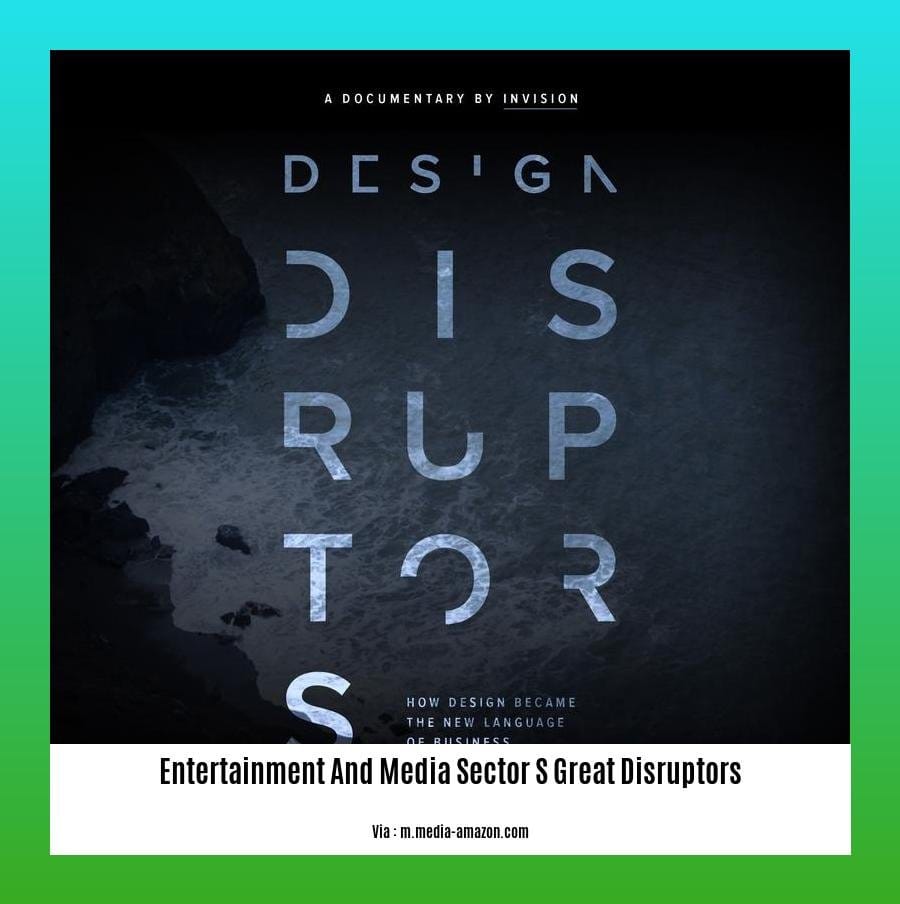The Entertainment and Media Sector’s Great Disruptors: Transforming the Industry Landscape – The entertainment and media sector is undergoing a period of profound transformation, driven by a wave of disruptors that are challenging traditional business models and creating new opportunities for growth. From streaming services to virtual reality, these disruptors are reshaping the way we consume and interact with entertainment and media content.
Key Takeaways:

- Streaming services challenge traditional media companies: Streaming services are becoming increasingly popular and are challenging the dominance of traditional media companies.
- Personalized experiences are key: Consumers increasingly expect personalized and immersive experiences, and companies must adapt to meet this demand.
- AI is transforming the industry: Artificial intelligence (AI) is playing a growing role in the entertainment and media industry, from content creation to distribution.
- Data is essential: Data is crucial for understanding consumer behavior and creating successful content.
- Disruption is driving innovation: Disruption is a major force in the entertainment and media industry, and it is leading to the emergence of new technologies, business models, and content formats.
Entertainment and Media Sector’s Great Disruptors
Prepare to be enthralled as we dive into the entertainment and media sector’s great disruptors. These formidable forces are reshaping the industry, shaking the foundations of traditional models, and ushering in an era of unprecedented possibilities.
Streaming Services: A Streaming Revolution
Streaming services like Netflix, Hulu, and Disney+ have shattered the dominance of cable and satellite TV. On-demand access to vast content libraries has captivated audiences, leaving traditional broadcasters scrambling to keep up. Streaming has empowered consumers, giving them the freedom to choose what, when, and where they watch.
Social Media: The New Content Hub
Social media platforms have become the go-to destination for entertainment discovery and sharing. From viral videos to influencer-led trends, social media has democratized content creation and distribution. Creators can now bypass traditional gatekeepers and connect directly with their audience, building thriving communities around their work.
AI: The Innovation Engine
Artificial intelligence (AI) is transforming the entertainment experience like never before. From personalized recommendations to immersive virtual reality environments, AI is pushing the boundaries of creativity and engagement. AI-powered algorithms analyze user data, tailoring content to individual preferences, ensuring that every experience is unique.
VR/AR: Beyond the Screen
Virtual and augmented reality (VR/AR) technologies are blurring the lines between the real and digital worlds. VR headsets transport users into immersive virtual environments, making them feel like they’re part of the action. AR overlays digital content onto the real world, creating interactive experiences that seamlessly blend the physical and virtual realms.
UGC: The Power of the Crowd
User-generated content (UGC) has become an integral part of the entertainment landscape. From fan fiction to online reviews, UGC gives a voice to the audience, fostering a sense of community and shaping the narrative around entertainment. Creators are embracing UGC, collaborating with fans to co-create content that resonates with their passions.
These entertainment and media sector’s great disruptors are transforming the way we create, consume, and share entertainment content. As these technologies continue to evolve, we can expect even more groundbreaking innovations that will redefine the future of entertainment and leave us perpetually awestruck.
Are you curious about the extraordinary individuals who pioneers who revolutionized entertainment and media? Their contributions have not only reshaped the way we consume entertainment but also transformed the media landscape. From the innovative minds who disrupted arts and communication to the trailblazers who transformed content and delivery, this group of visionaries have left an enduring mark on our cultural landscape.
Artificial Intelligence (AI)
AI is revolutionizing the entertainment and media industry, enhancing experiences, empowering creators, and driving innovation. Here’s how:
Digital Avatars: AI-generated avatars are becoming commonplace, enabling creators to bring characters to life and engage audiences in new ways.
Personalized Content: AI algorithms analyze user preferences, tailoring entertainment experiences to their unique tastes and interests.
Content Optimization: AI is used to optimize content production and distribution, identifying trends, and predicting audience reactions.
Job Displacement: While AI may replace certain roles, it also creates new opportunities in fields like data analysis and digital content creation.
Cost Reduction: AI automation can streamline production processes, reducing costs and enabling creators to focus on creativity.
Enhanced User Experience: AI improves entertainment consumption by providing personalized recommendations, enhancing accessibility, and creating more immersive experiences.
Key Takeaways:
- AI-generated digital avatars enhance storytelling and audience engagement.
- AI personalizes entertainment experiences, catering to individual preferences.
- AI optimizes content production and distribution, leveraging data and analytics.
- AI creates new job opportunities while automating certain tasks.
- AI reduces production costs through automation, freeing up resources for creativity.
- AI improves the entertainment experience through personalized recommendations and enhanced accessibility.
Citation:
- The World Economic Forum: 6 Ways AI Is Likely to Disrupt the Entertainment Industry
Virtual and Augmented Reality (VR/AR)
VR/AR are reshaping entertainment, creating immersive experiences.
- VR gaming transports you into virtual worlds with unparalleled immersion.
- AR enhances live events with digital content, making you part of the action.
- VR/AR spawns new storytelling and entertainment possibilities.
Key Takeaways:
- Immersive experiences: VR/AR blurs reality and the digital realm, bringing entertainment to life.
- Enhanced storytelling: VR/AR empowers creators to craft immersive narratives.
- Innovative entertainment: VR/AR fosters new forms of gaming, films, and live events.
Citation:
- Immersive Media Technologies: The Acceleration of Augmented and Virtual Reality in the Wake of COVID-19
User-Generated Content (UGC): Revolutionizing the Entertainment and Media Landscape
Streaming services, social media, virtual reality, and artificial intelligence are reshaping the entertainment and media industry. But it’s not just the technologies disrupting this space. User-Generated Content (UGC) is quietly transforming how we consume and interact with our favorite content.
Gone are the days when entertainment was passively consumed from a screen. Today, audiences are actively participating in the creation and distribution of content. They’re sharing their opinions, experiences, and perspectives, making entertainment a more participatory and engaging experience.
UGC can take many forms – from viral videos that spread like wildfire to online reviews that can make or break a movie’s success. It gives a voice to audiences, fosters community, and shapes the narrative around entertainment.
Key Takeaways:
- UGC is content created and shared by users, not brands.
- It’s seen as more authentic and trustworthy than brand-created content.
- UGC can build trust, enhance brand engagement, and increase sales.
- Brands need to carefully curate and manage UGC to ensure it aligns with their brand values.
- UGC can be used in various formats, including images, videos, GIFs, and text.
Most Relevant URL Source:
- The Rise of User-Generated Content and Its Impact on Brand by Forbes:

FAQ
Q1: How is artificial intelligence (AI) disrupting the entertainment industry?
A1: AI is playing a growing role in the entertainment industry, from content creation to distribution. For example, AI algorithms can be used to personalize content recommendations, enhance production and distribution, and even create new forms of entertainment.
Q2: What impact is user-generated content (UGC) having on the entertainment industry?
A2: UGC is becoming increasingly important in the entertainment industry, as consumers are increasingly looking for more authentic and trustworthy content. UGC can be used to build trust, enhance brand engagement, and increase sales. Additionally, UGC can be used in a variety of formats, including images, videos, GIFs, and text.
Q3: How is immersive media, such as virtual reality (VR) and augmented reality (AR), changing the entertainment industry?
A3: VR and AR are poised to revolutionize entertainment by creating more immersive and interactive experiences. VR gaming transports players into entirely digital worlds, offering an immersive experience. AR enhances live events and performances, allowing audiences to interact with digital content in real-time. VR and AR have the potential to create new forms of storytelling and entertainment.
Q4: What are the potential benefits of AI and VR/AR in the entertainment industry?
A4: AI and VR/AR have the potential to bring numerous benefits to the entertainment industry, including:
- Personalized entertainment experiences tailored to individual preferences
- Enhanced content production and distribution
- Job creation
- Cost reduction
- Improved user experience
- New forms of storytelling and entertainment
Q5: Are there any challenges associated with AI and VR/AR in the entertainment industry?
A5: While AI and VR/AR have the potential to revolutionize the entertainment industry, there are also some challenges that need to be addressed, such as:
- Ensuring that AI is used ethically and responsibly
- Addressing concerns about job displacement
- Overcoming technical challenges in developing and implementing VR/AR technologies
- Decoding Lawyer Abbr.: A Comprehensive Guide to Legal Abbreviations - November 22, 2024
- Navigating the Lucas County Auditor’s Office: Property Taxes, Assessments, and Online Resources - November 22, 2024
- Pampa Mourns Kaley Bilyeu, 18, Killed in DUI Crash - November 22, 2024














